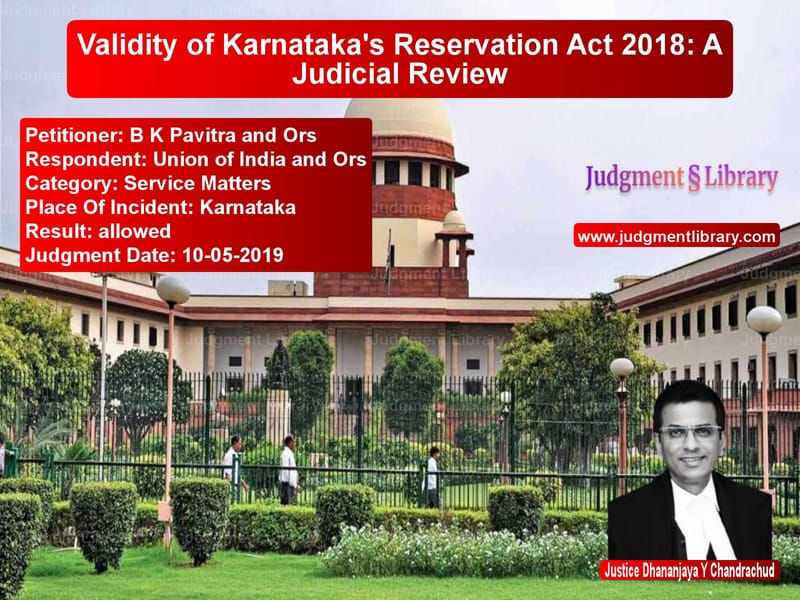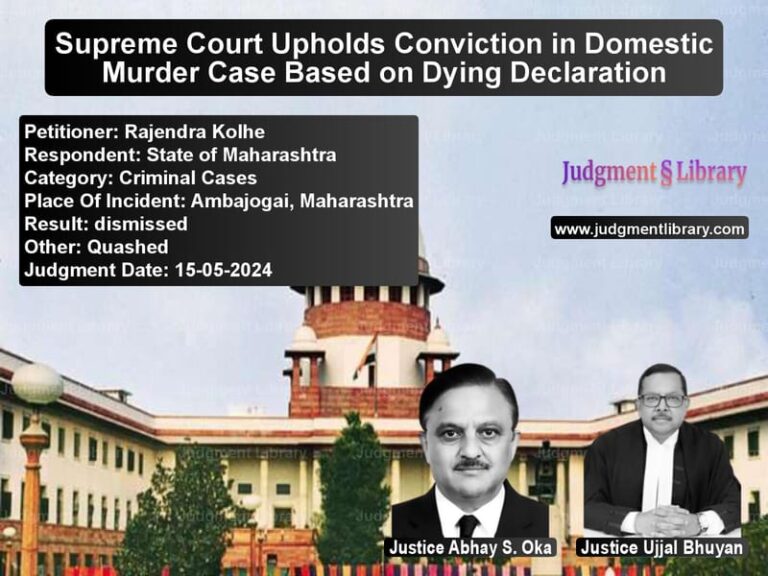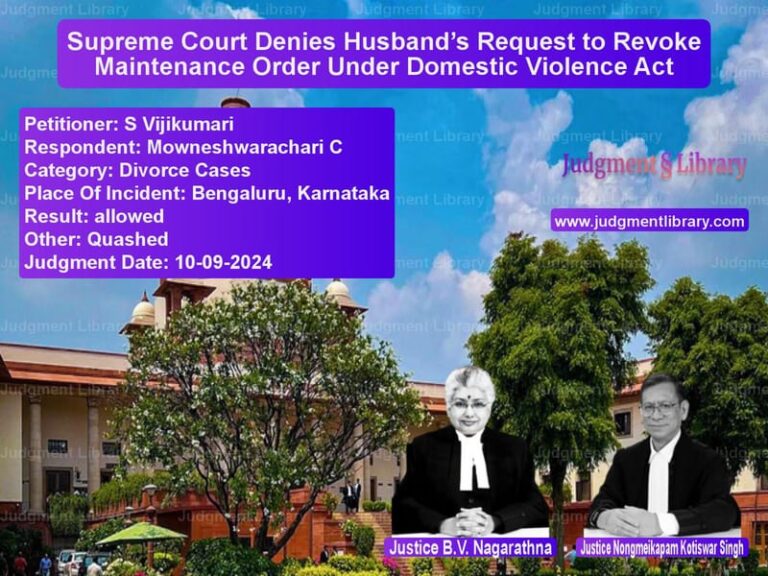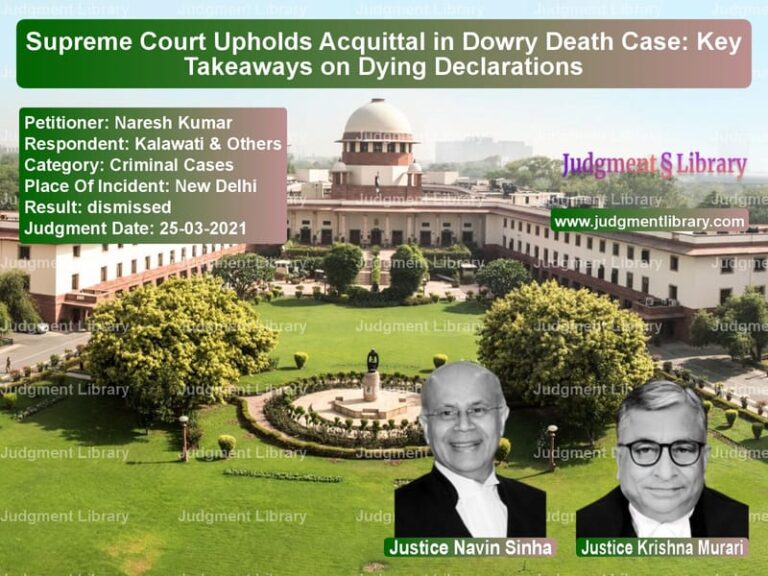Validity of Karnataka’s Reservation Act 2018: A Judicial Review
The Karnataka Extension of Consequential Seniority to Government Servants Promoted on the Basis of Reservation (to the Posts in the Civil Services of the State) Act 2018, commonly referred to as the Reservation Act 2018, was enacted to extend consequential seniority to SC/ST government servants promoted through reservation. The Act was a legislative response to the Supreme Court’s ruling in B K Pavitra I, which invalidated the Karnataka Reservation Act 2002 on the ground that the state had failed to collect quantifiable data on backwardness, inadequacy of representation, and overall efficiency, as required by the Supreme Court’s decision in Nagaraj.
The enactment of the Reservation Act 2018 raises key constitutional questions: Does it cure the defects identified in B K Pavitra I? Has the state collected adequate quantifiable data to justify consequential seniority? Does the law violate the principles of equality enshrined in Articles 14 and 16 of the Constitution?
The Constitutional Challenge
The primary legal challenge to the Reservation Act 2018 arose from its attempt to reintroduce consequential seniority for SC/ST employees promoted through reservation, despite the Supreme Court’s earlier ruling in B K Pavitra I. The petitioners argued that the Act merely sought to nullify the court’s decision without remedying its defects.
Judicial Precedents: Nagaraj and Jarnail Singh
In Nagaraj, the Supreme Court upheld the constitutional validity of reservations in promotions but mandated that states must demonstrate “compelling reasons”—quantifiable data on backwardness, inadequacy of representation, and overall administrative efficiency—before implementing such policies. The Court further ruled that the “creamy layer” concept applies to SC/ST promotions, ensuring that the benefits do not go to the most advanced among these communities.
In Jarnail Singh, the Supreme Court clarified that states do not need to collect quantifiable data to prove the backwardness of SCs and STs but must still establish inadequate representation and ensure that reservations do not affect administrative efficiency.
Government’s Rationale and the Ratna Prabha Committee Report
Following B K Pavitra I, the Karnataka government appointed the Ratna Prabha Committee to gather data on SC/ST representation in the state civil services and analyze its impact on administrative efficiency. The committee concluded that:
- SC/ST representation in government services remains inadequate.
- Providing consequential seniority would not affect administrative efficiency.
- The backlog of vacancies for SCs/STs must be filled to achieve proportional representation.
Petitioners’ Arguments Against the Act
The petitioners contended that:
- The Ratna Prabha Committee’s data was inadequate and did not analyze cadre-wise representation.
- Some government departments, such as the Public Works Department (PWD) and Karnataka Power Transmission Corporation Limited (KPTCL), already had SC/ST overrepresentation.
- The Act violated the Supreme Court’s ruling in Sabharwal by using vacancy-based rather than post-based reservation.
- By granting consequential seniority retrospectively from 1978, the Act unfairly disadvantaged general category employees.
State’s Defense of the Reservation Act 2018
The state government defended the Act by asserting that:
- The Act is not an attempt to nullify B K Pavitra I but to cure the defects identified by the Court.
- The Ratna Prabha Committee’s report was based on sound data collection methods.
- Consequential seniority is necessary to prevent stagnation of SC/ST employees who were promoted but subsequently superseded by general category employees due to the “catch-up” rule.
- The Act ensures compliance with the constitutional mandate of substantive equality.
Supreme Court’s Ruling
The Supreme Court upheld the Reservation Act 2018, ruling that:
- The Act cured the defects of the previous law by collecting quantifiable data on inadequate representation and administrative efficiency.
- The law does not violate Article 14 or 16, as it aligns with the principles established in Nagaraj and Jarnail Singh.
- The retrospective application of consequential seniority was justified as it aimed to correct past injustices.
- The Act does not violate the principle of efficiency in administration, as promotions were made based on merit and seniority.
Conclusion
The Supreme Court’s ruling on the Karnataka Reservation Act 2018 reaffirms the principle that affirmative action must be based on quantifiable data and cannot violate the fundamental right to equality. While the ruling validates the state’s power to provide for consequential seniority, it underscores the necessity for governments to ensure that reservation policies comply with constitutional requirements.
The case serves as an important precedent in the evolving jurisprudence on affirmative action in India. By recognizing both the need for social justice and the importance of administrative efficiency, the Court has attempted to balance competing interests in the application of reservations in promotions.
Petitioner Name: B K Pavitra and Ors.Respondent Name: Union of India and Ors.Judgment By: Justice Dhananjaya Y Chandrachud.Place Of Incident: Karnataka.Judgment Date: 10-05-2019.
Don’t miss out on the full details! Download the complete judgment in PDF format below and gain valuable insights instantly!
Download Judgment: B K Pavitra and Ors vs Union of India and O Supreme Court of India Judgment Dated 10-05-2019.pdf
Direct Downlaod Judgment: Direct downlaod this Judgment
See all petitions in Promotion Cases
See all petitions in Public Sector Employees
See all petitions in Employment Disputes
See all petitions in Judgment by Dhananjaya Y Chandrachud
See all petitions in allowed
See all petitions in supreme court of India judgments May 2019
See all petitions in 2019 judgments
See all posts in Service Matters Category
See all allowed petitions in Service Matters Category
See all Dismissed petitions in Service Matters Category
See all partially allowed petitions in Service Matters Category







